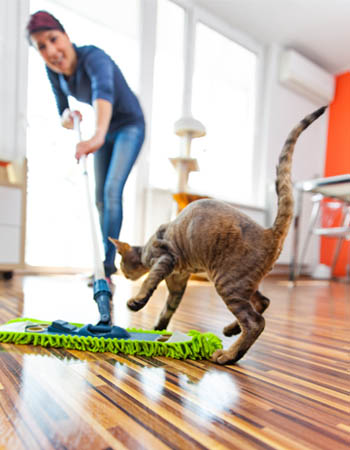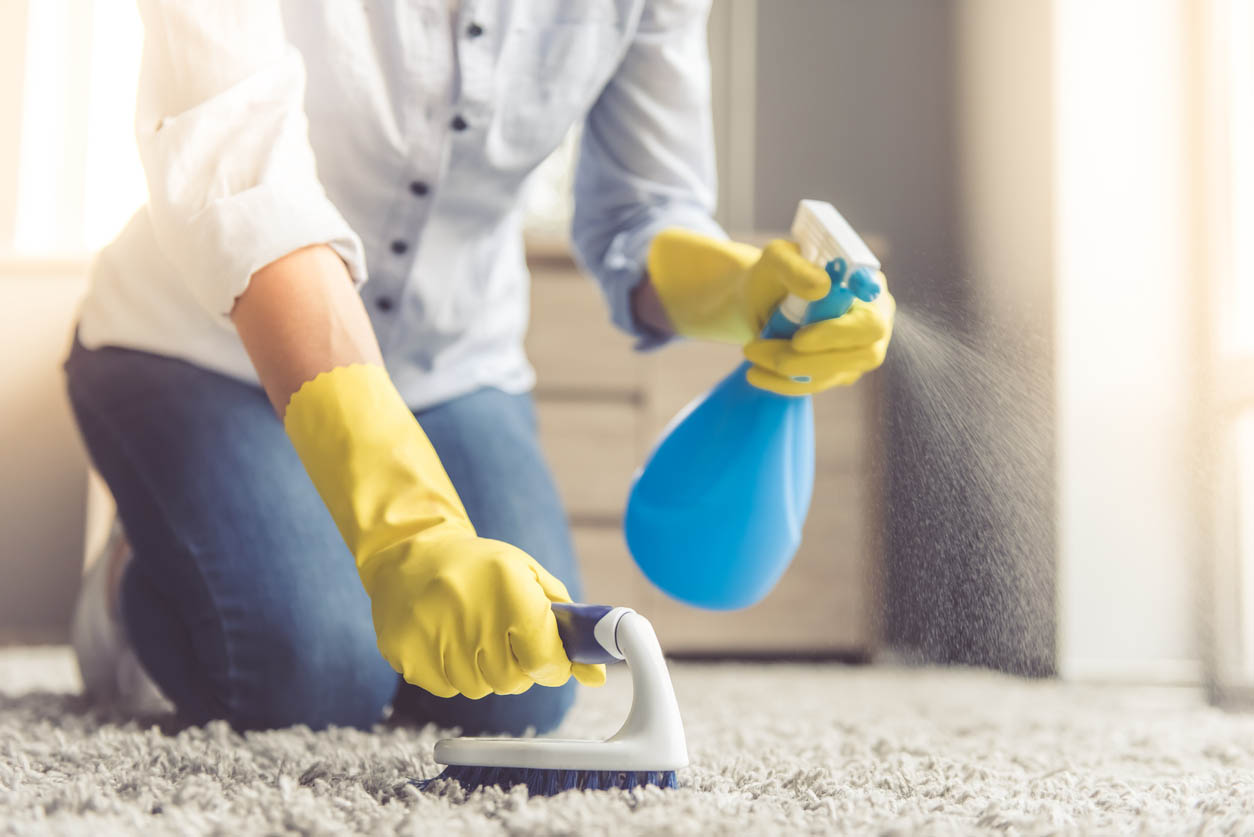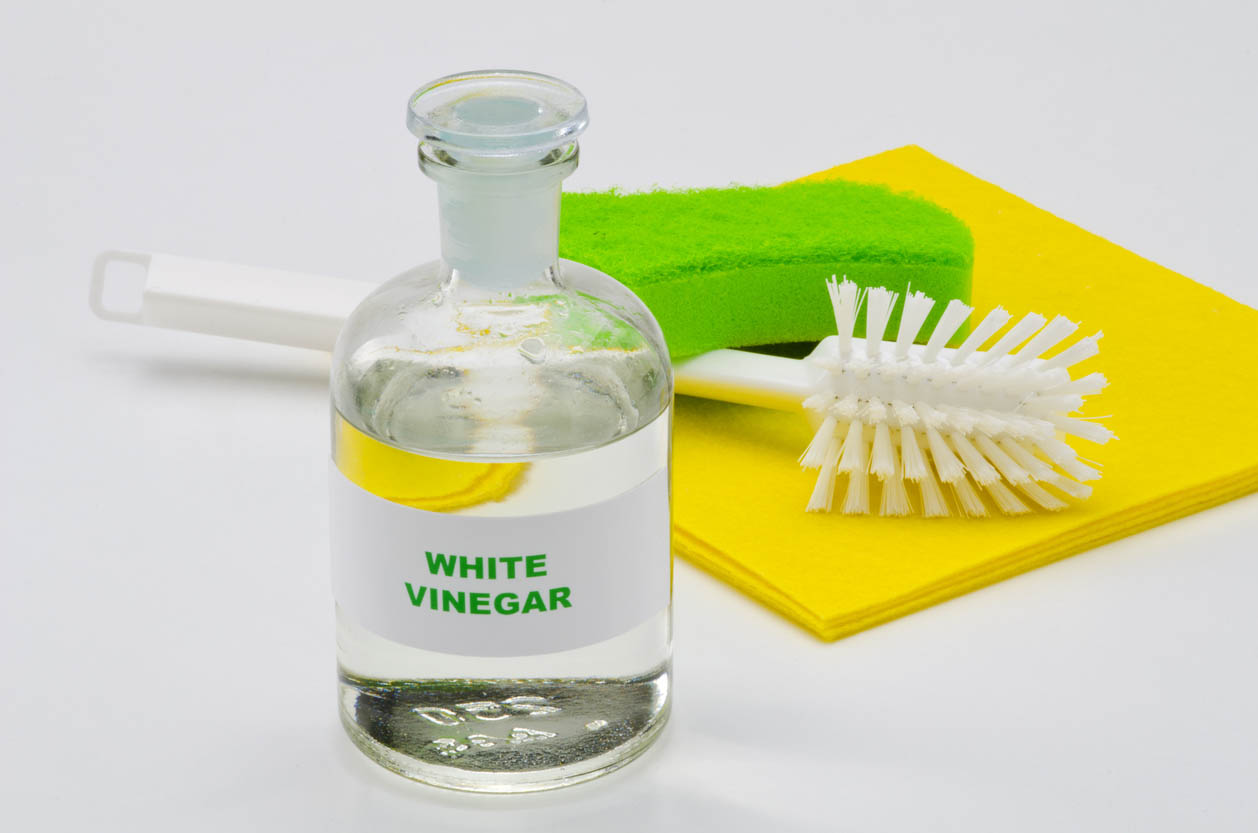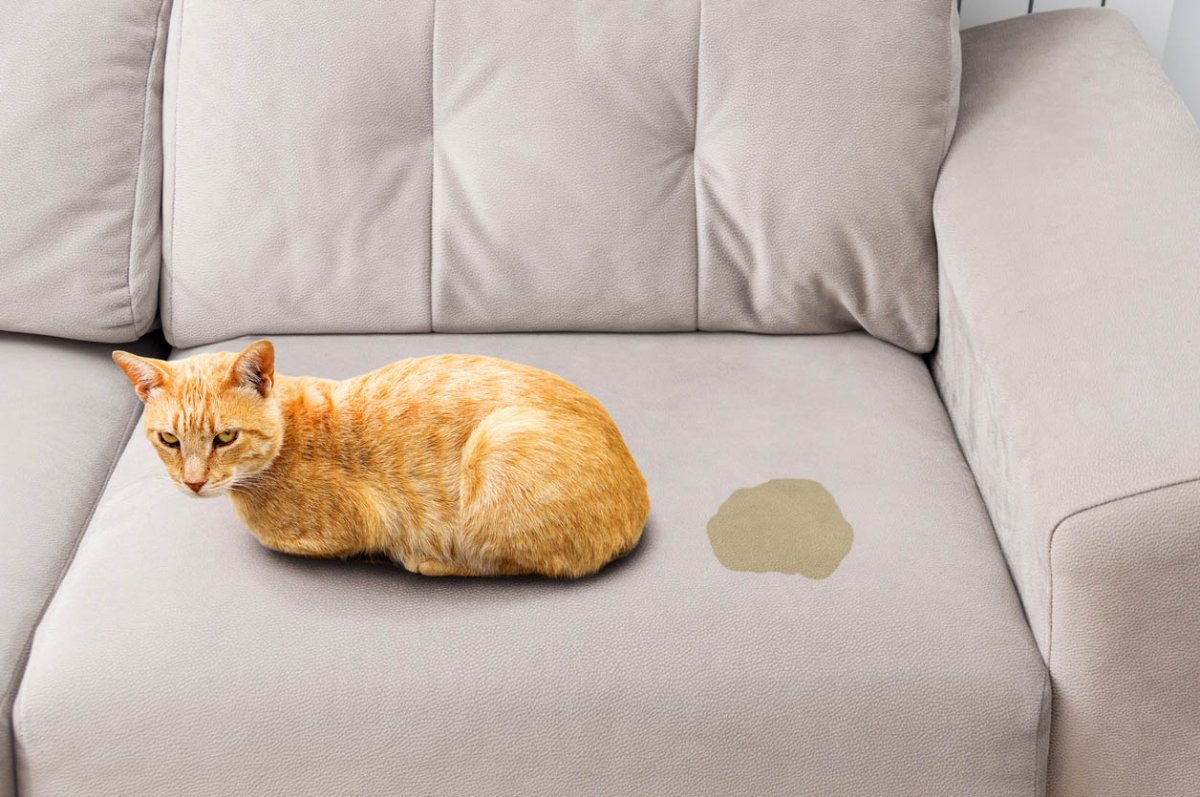We may earn revenue from the products available on this page and participate in affiliate programs. Learn More ›
All cat owners understand the struggle of maintaining a clean and fresh-scented home despite their furry ones shedding and using the litter box. But sometimes, cats and kittens decide to break the rules and go outside of the litter box. And unfortunately, when a cat pees, it can leave behind an unpleasant urine smell that is hard to eliminate.
While it may be easy to clean up the urine itself, the smell can linger if it’s not cleaned properly and promptly. Here’s how to get rid of cat pee smell in a home and reduce the likelihood of repeat urination.
Time required: Around 30 minutes
Difficulty: Beginner
Estimated cost: Starting at $10
Tools & Materials
Bobvila.com may earn a commission from purchases made through these links.
Before You Begin…

Unlike dogs, cats don’t need a lot of training to be housebroken. Using the litter box should be instinctual, even in young kittens. If your cat ignores the litter box, there’s usually a problem with the litter box or the household dynamics. The box might be too small, or they don’t like the litter. They might even have a urinary or bowel issue, and they associate the litter box with pain from urinating or defecating, so they choose to go outside of the box. Cats are territorial animals, too, and peeing in the house is a way to mark that territory. If you have multiple cats, make sure that you have enough litter boxes in your home (the general rule is one litter box per cat, plus one extra).
Tips for How to Get Rid of Cat Pee Smell
- Cats are known to be curious, and whenever there’s a task going on, they’ll want to be in the middle of it. Whether it’s by confining them to another room for a few minutes or having someone else play with the cat while you work, make sure there are no cats around to interrupt the cleaning process. You can place a basket over any area on the carpet while the cleaner is sitting on the stain.
- Intense heat can worsen the urine smell and make it linger, so avoid using a steam cleaner directly on the spot.
- For older stains or a deeply embedded urine smell, especially in carpets, it may be worth it to hire a professional cleaning service to eliminate the odor once and for all.
Safety Considerations
- Cat urine contains high ammonia levels, which can cause respiratory distress, especially for those suffering from bronchitis or asthma. Consider wearing a face mask and gloves, and be sure to thoroughly wash your hands after cleaning up the area.
- What many suspect is cat urine odor might actually be mold. Sometimes, the pungent smell can indicate a mold problem, like the occurrence of toxic black mold, which warrants professional remediation.
STEP 1: Use an old cloth or paper towels to absorb as much urine as possible.
Before using any products, first, soak up the cat urine with an old cloth or paper towels as soon as possible after the accident. This will help absorb it, so there isn’t much left on the carpet or the surface. The less urine there is, the less need there will be to deep clean.
If there is cat urine in any clothing, linen, or drapes, wash them or have them dry-cleaned as soon as possible.

STEP 2: Saturate any soft areas with an enzymatic cleaner.
Wondering how to get cat pee out of the carpet? Use an enzymatic cleaner or cat urine remover to break down the stain and smell. This will “eat” the urine, ensuring its odor is completely gone. This is crucial because once a cat has urinated on an area, they’ll be drawn back to that same area again and again. Enzyme cleaners make it so that cats won’t be able to pick up the scent. Follow the instructions on your particular cleanser: either let it dry or remove any residual foam. For stubborn odors, consider hiring a professional cleaner to remove the scent entirely.
STEP 3: Use dish soap and cool water or floor cleaner on any hard surfaces.
For hard surfaces, use dish soap and cool water or floor cleaner. First, blot away the cat urine with a cloth or paper towel. Then, mix a tablespoon of dish soap into two cups of cool water, or use floor cleaner, wet a cloth or paper towel in the solution, and wipe down the surface. To finish, blot the area dry with a clean cloth or paper towel. Make sure you clean cat pee from hardwood floors as soon as possible. If it’s left for some time, it can start to erode the finish and even the wood floors, meaning you might need to get your floors refinished sooner than you anticipated.
STEP 4: Sprinkle baking soda on the area to continue neutralizing odors.
Baking soda is excellent for removing odors. Sprinkling some baking soda on the carpet or other surfaces after absorbing most of the cat urine will help eliminate the smell for the long term. Just be sure to let it sit for at least half an hour before vacuuming it up.
STEP 5: Keep your cat away from the area you’re cleaning.
Make sure there are no cats around throughout the cleaning process, as some of the products used can irritate them. Additionally, they might track the urine throughout the house, making it more challenging to treat the odor. Simply shut them in a safe room or enlist another household member to keep your cat occupied. While the carpet cleaner is sitting on the stain, keep a basket on top of it. That way, they can’t lick up or get too close to the toxic ingredients.

STEP 6: Mix vinegar or an enzyme cleaner into the laundry to remove odor from clothes and bedding.
Vinegar helps neutralize cat pee and eliminate its smell. For clothing or bedding with a strong urine smell, vinegar acts as a good substitute for enzyme cleaner (which is also an option here) to mix into the laundry.
STEP 7: Figure out why your cat won’t use the litter box.
If inappropriate urination is common in the household, investigating why the cat is not using their litter box is worth exploring. Get to the root of the issue to prevent this from happening again. Ensure the litter box is cleaned at least once a day and is in the same location, so the cat does not get confused. There should be enough litter boxes in the house (one per cat plus one extra), and they should be amply sized to give your cat room to move around. However, when all else fails, contact a vet or other professional, as the cat may be experiencing health issues.
These methods of cleaning cat urine and getting rid of urine odor will promote a healthy, happy, and pleasant-smelling home for homeowners and their felines. Just be sure to keep cats away from the area while cleaning, so they aren’t exposed to any toxic chemicals or ingredients. If the smell from previous accidents persists, contact a professional home cleaning service that will be able to tackle those tough, set-in smells for a fresh home.


